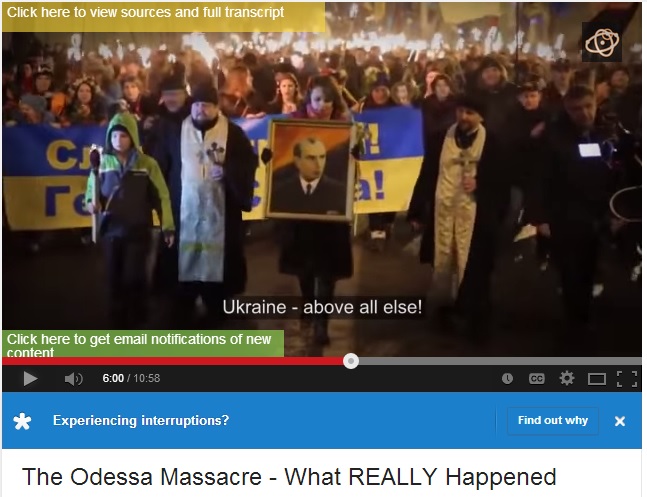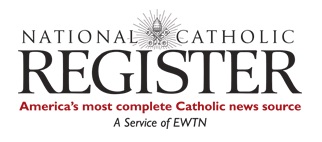
Revelation 18:23
"And the light of a candle shall shine no more at all in thee; and the voice of the bridegroom and of the bride shall be heard no more at all in thee: for thy merchants were the great men of the earth; for by thy sorceries were all nations deceived.
18:24 And in her was found the blood of prophets, and of saints, and of all that were slain upon the earth."
"The Beast", also called; "Babylon The Great"; and
"The Little Horn" is about to come face to face
with The King of Heaven & Earth.
From the very beginning of the early
Christian Church, the spirit of anti-christ
has been working to take control of
Christ's Church.
Her doctrine of "perpetual war" keeps her
factories going in high gear producing
killing machines 24 seven ! Ukraine is
her latest project !
http://www.ncregister.com/site/article/searching-for-peace-in-ukraine/
Searching for Peace in Ukraine
News Analysis: Catholic and Orthodox Religious Leaders Promote Reconciliation
·
·
·
by Victor Gaetan, Register Correspondent Thursday, May 29, 2014 9:28 AM Comment
WASHINGTON — When Pope Francis tweeted on May 1, "I ask everyone with political responsibility to remember two things: human dignity and the common good" to his 11 million-plus Twitter followers, he probably had Ukraine in mind.
So far, pleas for peace have been ignored by political actors on all sides of the crisis, with rhetoric almost entirely displacing reconciliation.
After meeting with Pope Francis at the Vatican on April 26, Ukrainian interim Prime Minister Arseniy Yatsenyuk pointedly blamed Russia for "getting ready to start World War III because it intends to overrun Ukraine, both politically and militarily." He then skipped the canonisations of Popes John XXIII and John Paul II to return to his riven country.
Although the Ukrainian Greek Catholic Church (UGCC) and Catholic institutions such as the Ukrainian Catholic University were highly involved in demonstrations precipitating the collapse of President Viktor Yanukovitch’s government in late February, Vatican leaders have been watchful, as the situation degenerates into civil war and fears grow of wider international conflict.

The national standoff turned global when the Russian government annexed a strategic peninsula, Crimea, in March, after local residents voted overwhelmingly to secede from Ukraine.
Crimea had been part of Ukraine since the fall of the Soviet Union in 1991, having been transferred, as an administrative unit, to Ukraine in 1954 by Nikita Khrushchev on a whim. But Crimea was a Russian territory for centuries before.
The United States and European Union consider Russia’s move to be an act of aggression. Both responded with a variety of sanctions, mainly canceling travel visas and freezing the assets of a short list of officials in Putin’s inner circle. The U.S. also banned future exports of some U.S. technology. So far, the sanctions have not had a major impact. At home, Russian President Vladimir Putin’s popular approval now stands at a three-year high of 80%.
The main question, with global implications, is whether Russia is behind "separatist" activism in eastern and southern regions of Ukraine, where, since early April, men have put on ragtag uniforms, taken over administrative buildings, set up barricades and checkpoints and generally challenged the interim government in Kiev as a "junta" run by "fascists." Some demand autonomy within the Ukrainian Republic; others want to join Russia.
In turn, the Kiev government calls pro-Russian protesters "terrorists" and has mobilized military units to defeat them — a strategy that has led, inevitably, to an escalating death toll. Neither side appears to be preoccupied with human dignity nor the common good.
What we are witnessing in Ukraine is how disinformation — and distrust — can push a country to armed conflict, according to Keith Darden, associate professor at Washington’s American University, in several thoughtful essays, including "The War on Truth in Ukraine."
Darden recounts how the unelected interim government in Kiev sees a Russian hand behind every challenge to its authority, while activists in regions more sympathetic to Russia, generally in the east and south, insist Western Europe and the U.S. are imposing their will through the new government in Kiev.
With no shared "basic reality," both sides are easily manipulated by propaganda about the other, which undermines the ability to see either human dignity or common good.
On the key issue of Russian involvement, confusion is exemplified by The New York Times, which ran a photo story on April 20 directly linking eastern Ukrainian militiamen to the Russian military.
Less than two weeks later, the paper backed away from its analysis; "Behind the Masks in Ukraine, Many Faces of Rebellion" emphasizes that many of Kiev’s opponents are independent Ukrainian nationals with various ties to Russia, who don’t necessarily want to break up the nation — but who don’t trust the interim government as legitimate or representative.
The authors explain: "The rebels … [in Donetsk, an eastern province which was the deposed president’s home base] appear to be Ukrainians but, like many in the region, have deep ties to and affinity for Russia. They are veterans of the Soviet, Ukrainian or Russian Armies, and some have families on the other side of the border. Theirs is a tangled mix of identities and loyalties." Hardly puppets.
Top American military officers admit the situation in Ukraine is very fluid. U.S. Air Force Gen. Phillip Breedlove, supreme commander of NATO, told political leaders in Canada May 5 that he expected an invasion by Russia into eastern Ukraine until just before he spoke in Canada. Now, he thinks Russian goals will be achieved without direct military intervention.
Read more: http://www.ncregister.com/site/article/searching-for-peace-in-ukraine/#ixzz34d90r2lW
